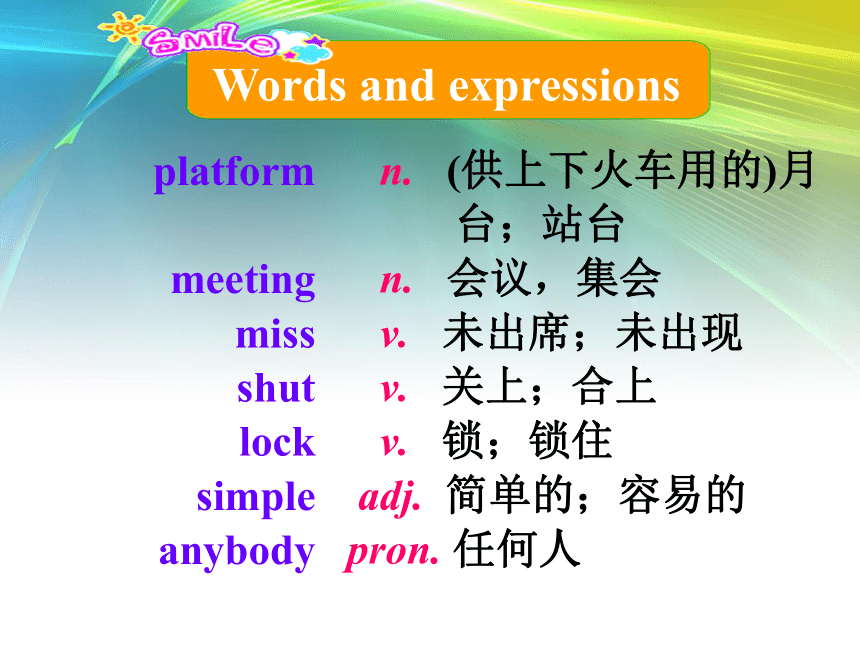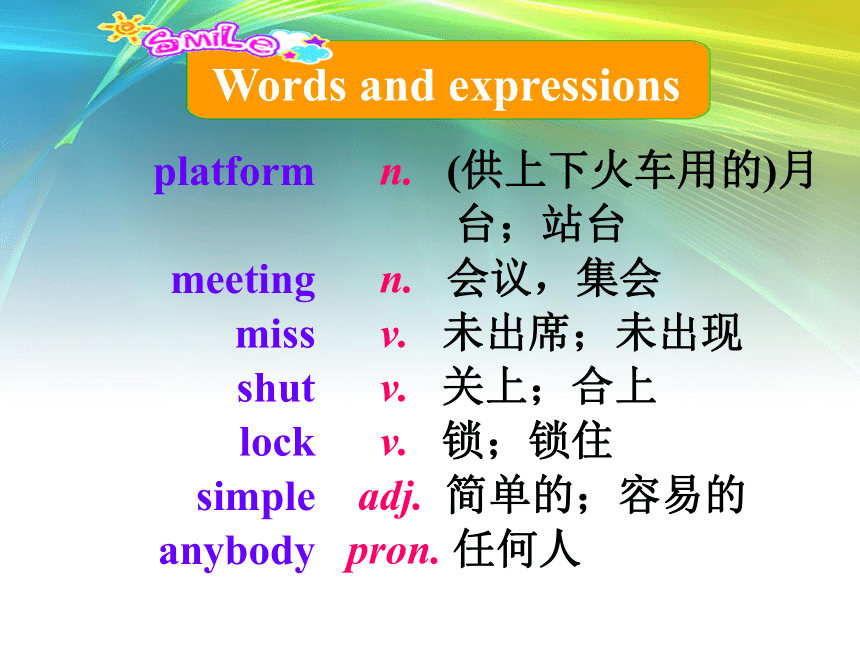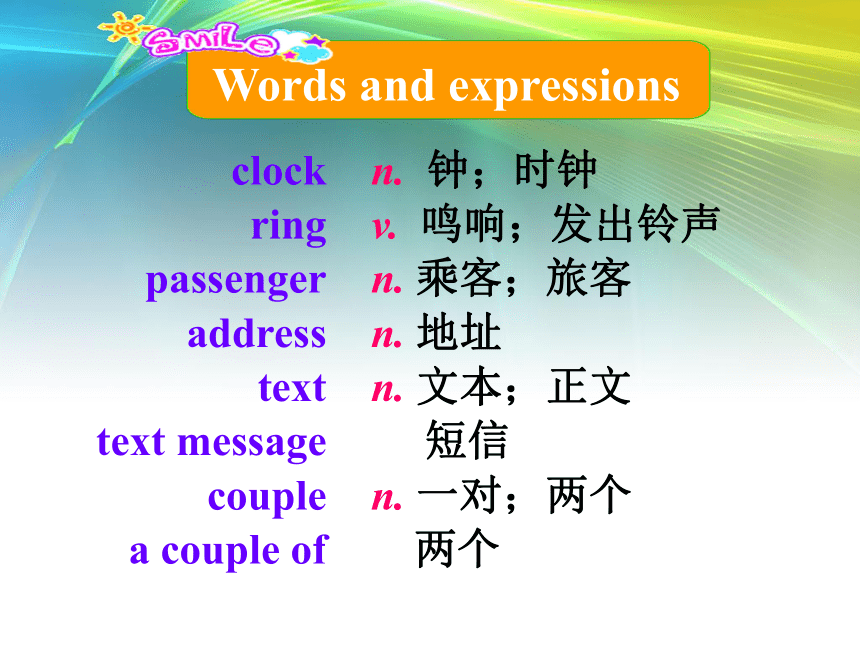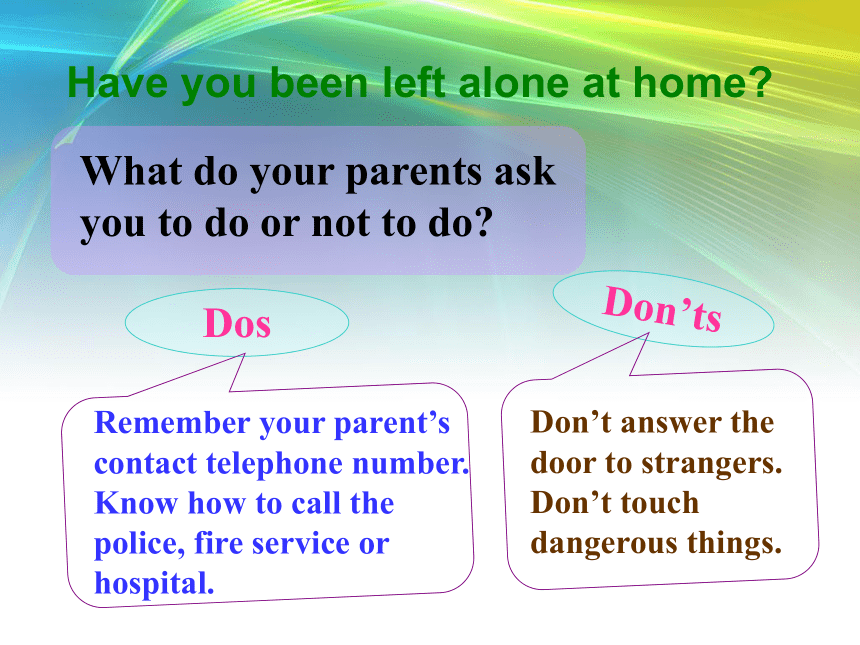Module 4 Home alone Unit 1 I can look after myself, although it won’t be easy for me.课件+嵌入音频24张PPT
文档属性
| 名称 | Module 4 Home alone Unit 1 I can look after myself, although it won’t be easy for me.课件+嵌入音频24张PPT |  | |
| 格式 | zip | ||
| 文件大小 | 7.5MB | ||
| 资源类型 | 教案 | ||
| 版本资源 | 外研版 | ||
| 科目 | 英语 | ||
| 更新时间 | 2020-07-30 19:40:33 | ||
图片预览









文档简介
(共24张PPT)
n.
(供上下火车用的)月
台;站台
n.
会议,集会
v.
未出席;未出现
v.
关上;合上
v.
锁;锁住
adj.
简单的;容易的
pron.
任何人
platform
meeting
miss
shut
lock
simple
anybody
clock
ring
passenger
address
text
text
message
couple
a
couple
of
n.
钟;时钟
v.
鸣响;发出铃声
n.
乘客;旅客
n.
地址
n.
文本;正文
短信
n.
一对;两个
两个
n.
(供上下火车用的)月
台;站台
n.
会议,集会
v.
未出席;未出现
v.
关上;合上
v.
锁;锁住
adj.
简单的;容易的
pron.
任何人
platform
meeting
miss
shut
lock
simple
anybody
clock
ring
passenger
address
text
text
message
couple
a
couple
of
n.
钟;时钟
v.
鸣响;发出铃声
n.
乘客;旅客
n.
地址
n.
文本;正文
短信
n.
一对;两个
两个
Module
4
Home
alone
Have
you
been
left
alone
at
home?
What
do
your
parents
ask
you
to
do
or
not
to
do?
Remember
your
parent’s
contact
telephone
number.
Know
how
to
call
the
police,
fire
service
or
hospital.
Don’t
answer
the
door
to
strangers.
Don’t
touch
dangerous
things.
Dos
Don’ts
Unit
1
I
can
look
after
myself,
although
it
won’t
be
easy
for
me.
Module
4
HOME
ALONE
although引导让步状语从句
表示“尽管.......(但是).........”,一般情况下可以与though互换。在口语中though较为常用。
eg:
He
went
on
fighting,though
he
was
wounded.
尽管受伤了,他还是继续战斗。
注:汉语中
尽管/虽然与但是同时使用,但英语中although和but不能同时使用。
Work
in
pairs.
Talk
about
the
picture.
1.
Where
are
Betty
and
her
parents?
2.
Is
Betty
travelling
with
her
parents?
They
are
at
the
station.
No,
she
isn’t
.
Read
and
complete
the
sentences.
1
Betty’s
parents
are
going
to
___________________________.
2
Her
parents
tell
her
to
_____________________________________________________________________________________________________________.
3
Betty
can
_____________________________________.
4
Betty’s
parents
usually
_______________________________.
5
Betty’s
mum
has
not
__________________________________.
(a
meeting
in)
Lhasa
look
after
herself/cook
simple
meals
wake
her
up
in
the
morning
given
Betty
their
address
in
Lhasa
Be
careful
with
the
door/shut
and
lock
the
door
when
she
goes
out/eat
plenty
of
fresh
fruit
and
vegetables
Read
and
fill
in
the
blanks.
Mum:
Now,
what's
our
train
number?
Dad:
T27
to
Lhasa.
It's
leaving
from
Platform
2.
Mum:
The
meeting
in
Lhasa
is
very
important
for
us,
but
I'm
sorry
you
can't
come
with
us,
Betty.
?Betty:
,
but
I
can't
two
weeks
of
school.
Mum:
Will
you
remember
everything
I've
told
you?
Be
especially
careful
with
the
door.
Shut
it
when
you're
in
and
lock
it
when
you
go
out.
So
am
I?
miss
?
Betty:
Yes,
Mum.
I
can
look
after
myself,
although
it
won't
be
easy
for
me.
Mum:
Well,
you
eat
plenty
of
fresh
fruit
and
vegetables.
And
I've
left
lots
of
your
favourite
biscuits.
Betty:Don't
worry.
I
can
cook
simple
meals.
Dad:
There
won't
be
to
wake
you
up
in
the
morning.
Betty:
I'll
be
fine.
My
clock
rings
loudly
it
will
certainly
wake
me
up.
Mum:
I'm
sure
I've
forgotten
something,
but
I
don't
know
what
it
is!
make
sure
?
anybody
?
知识点
1
So
am
I.
我也是(很遗憾)。
考向
so的用法
句式结构
句式意义
区别关键
so+be动词/助动词/情态动词+主语
表示前面所述肯定情况同样适用于后者,“……也……”。在口语交际中,可转化为“宾格代词+too”。
前后两句为不同主语。
表示与上文所述否定情况相同时,应该用句型“Neither/Nor+be/助动词/情态动词+主语.”结构。
例如:Mary
isn't
outgoing.
Neither/Nor
am
I.
玛丽不外向,我也不(外向)。
温馨
提示
Louise
can
dance
beautifully,
and
so
can
her
sister.
路易斯跳的舞蹈很优美,她的妹妹也是。
---Louise
can
dance
beautifully.
---So
she
can.
---路易斯跳的舞蹈很优美。
---的确如此。
so+主语+be动词/助动词/情态动词
表示对前面所述情况加以确认,“……的确如此”。
前后两句为相同主语。
—I
have
changed
my
job.
—________.
A.So
do
I B.So
have
I
C.So
I
do
D.So
I
have
典例
B
知识点
2
miss
/m?s/
v.未出席,未出现
miss作动词,意为“想念;错过;未击中;未出席;没见到;遗漏”。
考向
eg:
The
teacher
was
very
angry
because
I
missed
three
days
of
school
this
week.
老师很生气因为我本周缺了三天的课。
1)
He?missed?the
9:30
train.
2)
Please
be
quiet.
I
don't
want
to?miss?a
word
of
the
news
on
the
radio.
3)
The
two
boys?miss?their
father
a
lot.
错过
漏掉
想念
missing作形容词,意为“丢失的;失踪的”。
eg:The
police
are
looking
for
the
missing
girl.
警察正在寻找失踪的女孩。
拓展
写出下列画线单词的词性及汉语意思。
1.My
pen
is
missing.
I
want
to
buy
a
new
one.
________
________
2.The
boy
missed
his
parents
a
lot.
________
________
典例
形容词
丢失的
动词
想念
注意此短语的用法:
make
sure
to
do
sth.
make
sure
of
sth
make
sure
+
that
从句
Please
make
sure
to
turn
off
the
lights
when
you
leave.
离开时请务必要关灯。
Please
make
sure
of
the
time
and
the
place
of
the
meeting.
请确定一下开会的时间和地点。
Make
sure
the
work
has
been
done
before
you
leave.
你要确信你离开时工作已经完成。
知识点
3
make
sure:
意思是“确信、确定”
知识点
4
anybody
/'eni?b?di/
pron.
任何人
anybody用于否定句、疑问句或条件句中,相当于anyone,表示“任何人”。anybody用于肯定句中,表示“随便哪一个人”。
考向
eg:
Anybody
can
understand
this
story.
任何人都能理解这个故事。
eg:
Did
anybody/anyone
hear
of
such
a
thing?
有谁听说过这样的事吗?
Anybody
can
come
to
the
party.
任何人都可以参加这个聚会。
—Does
________
know
the
answer
to
the
question?
—Me.
A.everybody
B.
anybody
C.somebody
D.
nobody
典例
discussion
【点拨】题用句意理解法解答。根据句意“________知道这个问题的答案吗?”“我。”可排除A和D两项;又因为这是一个一般疑问句,故排除C。
B
so
loudly
that
是“so?+
形容词/副词
+
that
+
从句”的结构。so
…
that
意思是“如此…以至于…”
This
story
is
so
interesting
that
I
want
to
read
it
again.
这个故事如此有趣,我想再读一次。
He
spoke
so
quickly
that
I
couldn't
follow
him.
他说得如此快以至我跟不上他。
知识点
5
My
clock
rings
so
loudly
that
it
will
certainly
wake
me
up.
知识回顾
1.重点单词、短语
miss
anybody
be
important
for
sb
be
careful
with
look
after
make
sure
plenty
of
wake…up
2.
重点句型
So
am
I.
I
can
look
after
myself,
although
it
won’t
be
easy
for
me.
My
clock
rings
so
loudly
that
it
will
certainly
wake
me
up.
3.
语法
让步状语从句
结果状语从句
Homework
Remember
the
important
words,phrases
and
sentences.
Read
the
dialogue
fluently.
n.
(供上下火车用的)月
台;站台
n.
会议,集会
v.
未出席;未出现
v.
关上;合上
v.
锁;锁住
adj.
简单的;容易的
pron.
任何人
platform
meeting
miss
shut
lock
simple
anybody
clock
ring
passenger
address
text
text
message
couple
a
couple
of
n.
钟;时钟
v.
鸣响;发出铃声
n.
乘客;旅客
n.
地址
n.
文本;正文
短信
n.
一对;两个
两个
n.
(供上下火车用的)月
台;站台
n.
会议,集会
v.
未出席;未出现
v.
关上;合上
v.
锁;锁住
adj.
简单的;容易的
pron.
任何人
platform
meeting
miss
shut
lock
simple
anybody
clock
ring
passenger
address
text
text
message
couple
a
couple
of
n.
钟;时钟
v.
鸣响;发出铃声
n.
乘客;旅客
n.
地址
n.
文本;正文
短信
n.
一对;两个
两个
Module
4
Home
alone
Have
you
been
left
alone
at
home?
What
do
your
parents
ask
you
to
do
or
not
to
do?
Remember
your
parent’s
contact
telephone
number.
Know
how
to
call
the
police,
fire
service
or
hospital.
Don’t
answer
the
door
to
strangers.
Don’t
touch
dangerous
things.
Dos
Don’ts
Unit
1
I
can
look
after
myself,
although
it
won’t
be
easy
for
me.
Module
4
HOME
ALONE
although引导让步状语从句
表示“尽管.......(但是).........”,一般情况下可以与though互换。在口语中though较为常用。
eg:
He
went
on
fighting,though
he
was
wounded.
尽管受伤了,他还是继续战斗。
注:汉语中
尽管/虽然与但是同时使用,但英语中although和but不能同时使用。
Work
in
pairs.
Talk
about
the
picture.
1.
Where
are
Betty
and
her
parents?
2.
Is
Betty
travelling
with
her
parents?
They
are
at
the
station.
No,
she
isn’t
.
Read
and
complete
the
sentences.
1
Betty’s
parents
are
going
to
___________________________.
2
Her
parents
tell
her
to
_____________________________________________________________________________________________________________.
3
Betty
can
_____________________________________.
4
Betty’s
parents
usually
_______________________________.
5
Betty’s
mum
has
not
__________________________________.
(a
meeting
in)
Lhasa
look
after
herself/cook
simple
meals
wake
her
up
in
the
morning
given
Betty
their
address
in
Lhasa
Be
careful
with
the
door/shut
and
lock
the
door
when
she
goes
out/eat
plenty
of
fresh
fruit
and
vegetables
Read
and
fill
in
the
blanks.
Mum:
Now,
what's
our
train
number?
Dad:
T27
to
Lhasa.
It's
leaving
from
Platform
2.
Mum:
The
meeting
in
Lhasa
is
very
important
for
us,
but
I'm
sorry
you
can't
come
with
us,
Betty.
?Betty:
,
but
I
can't
two
weeks
of
school.
Mum:
Will
you
remember
everything
I've
told
you?
Be
especially
careful
with
the
door.
Shut
it
when
you're
in
and
lock
it
when
you
go
out.
So
am
I?
miss
?
Betty:
Yes,
Mum.
I
can
look
after
myself,
although
it
won't
be
easy
for
me.
Mum:
Well,
you
eat
plenty
of
fresh
fruit
and
vegetables.
And
I've
left
lots
of
your
favourite
biscuits.
Betty:Don't
worry.
I
can
cook
simple
meals.
Dad:
There
won't
be
to
wake
you
up
in
the
morning.
Betty:
I'll
be
fine.
My
clock
rings
loudly
it
will
certainly
wake
me
up.
Mum:
I'm
sure
I've
forgotten
something,
but
I
don't
know
what
it
is!
make
sure
?
anybody
?
知识点
1
So
am
I.
我也是(很遗憾)。
考向
so的用法
句式结构
句式意义
区别关键
so+be动词/助动词/情态动词+主语
表示前面所述肯定情况同样适用于后者,“……也……”。在口语交际中,可转化为“宾格代词+too”。
前后两句为不同主语。
表示与上文所述否定情况相同时,应该用句型“Neither/Nor+be/助动词/情态动词+主语.”结构。
例如:Mary
isn't
outgoing.
Neither/Nor
am
I.
玛丽不外向,我也不(外向)。
温馨
提示
Louise
can
dance
beautifully,
and
so
can
her
sister.
路易斯跳的舞蹈很优美,她的妹妹也是。
---Louise
can
dance
beautifully.
---So
she
can.
---路易斯跳的舞蹈很优美。
---的确如此。
so+主语+be动词/助动词/情态动词
表示对前面所述情况加以确认,“……的确如此”。
前后两句为相同主语。
—I
have
changed
my
job.
—________.
A.So
do
I B.So
have
I
C.So
I
do
D.So
I
have
典例
B
知识点
2
miss
/m?s/
v.未出席,未出现
miss作动词,意为“想念;错过;未击中;未出席;没见到;遗漏”。
考向
eg:
The
teacher
was
very
angry
because
I
missed
three
days
of
school
this
week.
老师很生气因为我本周缺了三天的课。
1)
He?missed?the
9:30
train.
2)
Please
be
quiet.
I
don't
want
to?miss?a
word
of
the
news
on
the
radio.
3)
The
two
boys?miss?their
father
a
lot.
错过
漏掉
想念
missing作形容词,意为“丢失的;失踪的”。
eg:The
police
are
looking
for
the
missing
girl.
警察正在寻找失踪的女孩。
拓展
写出下列画线单词的词性及汉语意思。
1.My
pen
is
missing.
I
want
to
buy
a
new
one.
________
________
2.The
boy
missed
his
parents
a
lot.
________
________
典例
形容词
丢失的
动词
想念
注意此短语的用法:
make
sure
to
do
sth.
make
sure
of
sth
make
sure
+
that
从句
Please
make
sure
to
turn
off
the
lights
when
you
leave.
离开时请务必要关灯。
Please
make
sure
of
the
time
and
the
place
of
the
meeting.
请确定一下开会的时间和地点。
Make
sure
the
work
has
been
done
before
you
leave.
你要确信你离开时工作已经完成。
知识点
3
make
sure:
意思是“确信、确定”
知识点
4
anybody
/'eni?b?di/
pron.
任何人
anybody用于否定句、疑问句或条件句中,相当于anyone,表示“任何人”。anybody用于肯定句中,表示“随便哪一个人”。
考向
eg:
Anybody
can
understand
this
story.
任何人都能理解这个故事。
eg:
Did
anybody/anyone
hear
of
such
a
thing?
有谁听说过这样的事吗?
Anybody
can
come
to
the
party.
任何人都可以参加这个聚会。
—Does
________
know
the
answer
to
the
question?
—Me.
A.everybody
B.
anybody
C.somebody
D.
nobody
典例
discussion
【点拨】题用句意理解法解答。根据句意“________知道这个问题的答案吗?”“我。”可排除A和D两项;又因为这是一个一般疑问句,故排除C。
B
so
loudly
that
是“so?+
形容词/副词
+
that
+
从句”的结构。so
…
that
意思是“如此…以至于…”
This
story
is
so
interesting
that
I
want
to
read
it
again.
这个故事如此有趣,我想再读一次。
He
spoke
so
quickly
that
I
couldn't
follow
him.
他说得如此快以至我跟不上他。
知识点
5
My
clock
rings
so
loudly
that
it
will
certainly
wake
me
up.
知识回顾
1.重点单词、短语
miss
anybody
be
important
for
sb
be
careful
with
look
after
make
sure
plenty
of
wake…up
2.
重点句型
So
am
I.
I
can
look
after
myself,
although
it
won’t
be
easy
for
me.
My
clock
rings
so
loudly
that
it
will
certainly
wake
me
up.
3.
语法
让步状语从句
结果状语从句
Homework
Remember
the
important
words,phrases
and
sentences.
Read
the
dialogue
fluently.
同课章节目录
- Module 1 Wonders of the world
- Unit 1 It's more than 2,000 years old.
- Unit 2 The Grand Canyon was not just big.
- Unit 3 Language in use
- Module 2 Public holidays
- Unit 1 My family always go somewhere interesting a
- Unit 2 We have celebrated the festival since the f
- Unit 3 Language in use
- Module 3 Heroes
- Unit 1 She trained hard,so she became a great play
- Unit 2There were few doctors, so he had to work ve
- Unit 3 Language in use
- Module 4 Home alone
- Unit 1 I can look after myself, although it won’t
- Unit 2 I became so bored with their orders that I
- Unit 3 Language in use
- Module 5 Museums
- Unit 1 Don't cross that rope!
- Unit 2 If you ever go to London, make sure you vis
- Unit 3 Language in use
- Module 6 Problems
- Unit 1 If I start after dinner, I'll finish it be
- Unit 2 If you tell him the truth now, you will sho
- Unit 3 Language in use
- Revision Module A
- Module 7 Great books
- Unit 1 We're still influenced by Confucius's idea
- Unit 2 It is still read and loved.
- Unit 3 Language in use
- Module 8 Sports life
- Unit 1 Daming wasn't chosen for the team last time
- Unit 2 He was invited to competitions around the w
- Unit 3 Language in use
- Module 9 Great inventions
- Unit 1 Will computers be used more than books in t
- Unit 2 Will books be replaced by the Internet?
- Unit 3 Language in use
- Module 10 Australia
- Unit 1 I have some photos that I took in Australia
- Unit 2 The game that they like most is Australian
- Unit 3 Language in use
- Module 11 Photos
- Unit 1 He's the boy who won the photo competition
- Unit 2 The photo which we liked best was taken by
- Unit 3 Language in use
- Module 12 Save our world
- Unit 1 If everyone starts to do something, the wor
- Unit 2 Repeat these three words daily: reduce, reu
- Unit 3 Language in use
- Revision Module B
